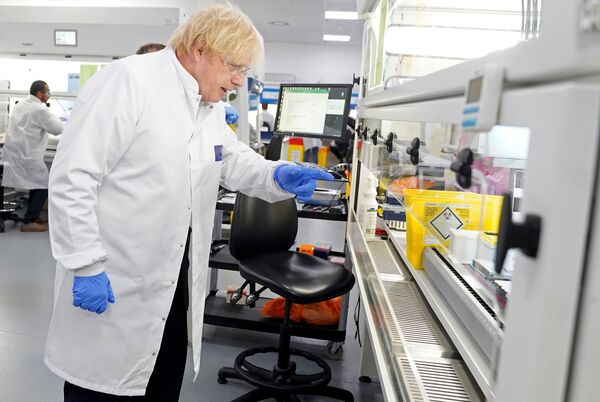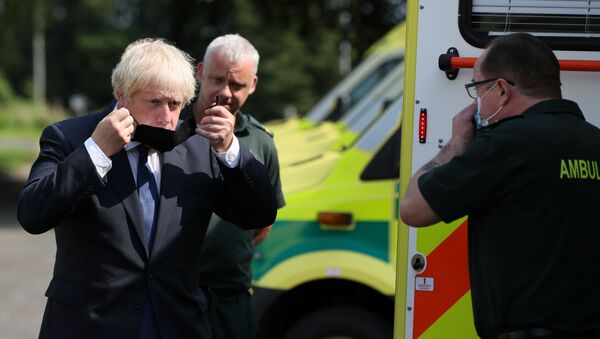Speaking at a Downing Street virtual news conference on Wednesday, the British PM said that the government is seeking to increase its daily coronavirus testing capacity to 500,000 by the end of next month and expressed hope that in the long-term millions of coronavirus tests would be processed every day giving results within minutes like a simple "pregnancy test".
The comments were made as Johnson announced strict new measures aimed at tackling the recent upsurge in COVID cases across Britain which envisaged a ban on social gatherings of more than six people in England both indoors and outdoors.
Costs Will be Enormous While Benefits Largely Theoretical
"A COVID test that is as quick and simple as 'a pregnancy test' would be ground-breaking, but the technology doesn’t exist yet," highlights Dr Jason Oke, senior statistician at the Nuffield Department of Primary Care Health Sciences, University of Oxford.
Besides this, such tests would have to be highly accurate to avoid huge numbers of false positives and prevent people from being quarantining when they don’t need to, according to Oke, who adds that "the costs of mass testing are likely to be enormous and the benefits largely theoretical". Thus, Britain needs another approach, the senior statistician argues.
"Standard epidemiological practice requires situations to be monitored and interventions to be highly targeted," echoes David Alexander, professor of risk and disaster reduction at University College London. "Anything else is a waste of resources and will probably be ineffective."
According to him, instead of energetically pursuing a policy of centralisation, the UK government should give more powers and resources to local and regional governments, as the situation is not homogenous in the UK. "The example of the second Coronavirus wave in Spain illustrates the point: the response has been regional", Alexander highlights. "Some regions have few cases, others have had many."
The mass testing strategy is fundamentally flawed, admits Dr. David Strain, clinical senior lecturer at the University of Exeter and chairman of the BMA's medical academic staff committee.
When it comes to the prime minister's suggestion that this will be as simple as “getting a pregnancy test” and give results within 15 minutes, it appears unlikely if not impossible in the timescale Johnson was suggesting to get the country back on track, according to the clinical lecturer.
The British Prime Minister voiced an idea of launching a pregnancy test-style plan for detecting coronavirus infections back in March. On 6 March 2020, Mologic Ltd, a developer of rapid diagnostic technologies, reported that it had been awarded circa £1 million ($1.2 million) by the UK government for making coronavirus testing kits. Professor Paul Davis, chief scientific officer of Mologic and inventor of a handy home pregnancy test, told The Telegraph at that time that the potential rapid COVID test would use saliva or blood.

Biology of Virus Upends Mass Testing Approach
However, apart from all the practical and cost implications, the biology of the virus is not going to make this testing approach particularly full proof, insists Dr Julian Tang, honorary associate professor in respiratory sciences at the University of Leicester.
"The reason for this is because after you have been exposed, there is a 2 to 14 day window when the virus may be incubating and latent and not detectable by routine diagnostic testing," the professor explains. "So, even if you test a proportion of the population every day, you are going to miss the virus in some people who are in their viral latency and incubation periods, who could start shedding and transmitting the virus even just after a relatively recent negative test result."
According to him, no routine diagnostic test is capable of detecting the virus during the latency period.
"So, just in terms of the virology, this approach is likely to fail," the academic opines.
Dr. David Strain appears to share these concerns: he underscores that existing technology has been demonstrated to miss up to one third of people who have early-stage COVID-19..
"After a second test 48 hours later, we still miss over a quarter of people," he stresses. "It has been suggested that those who test negative are in some way less infectious, but that is by no means certain."
No matter how good any technology is, failures of logistics and risk management could still nullify its efficiency, according to David Alexander.
"In my opinion, some of the most serious mistakes made by the British government have involved failure to utilise and develop the emergency planning and management system," he emphasises. "The Civil Contingencies Act has been abandoned in favour of a piece of legislation, the Coronavirus Act, which is in places incomprehensible. Many of the errors have involved failures of logistics and risk management, both of which are the preserve of emergency planners and managers."
In addition, David Strain warns that "the prime minister's comments about using a test to 'go about normal life if you’re negative' may undermine the credibility of some of the other very responsible measures that were announced." Among those measures is the halting of larger social gatherings, delaying the reopening of large venues moving the use of face coverings, and the "rule of 6" from guidance to law.
"Given the history of how COVID-19 testing in the UK has developed over the last months, it is likely that a candidate COVID-19 vaccine may be licensed and available by the time this mass testing programme is even ready to start," Dr Julian Tang foresees.
Meanwhile, a British pharma flagship, AstraZeneca, temporarily halted its phase three trials of a possible coronavirus vaccine on Tuesday for a safety review. It was earlier reported that the firm's anti-COVID drug would become available in the UK in the beginning of 2021. According to No 10, however, the Johnson government sealed early access to the vaccine candidate. To date, the UK has registered 360,544 confirmed coronavirus cases and 41,697 COVID-related deaths.


